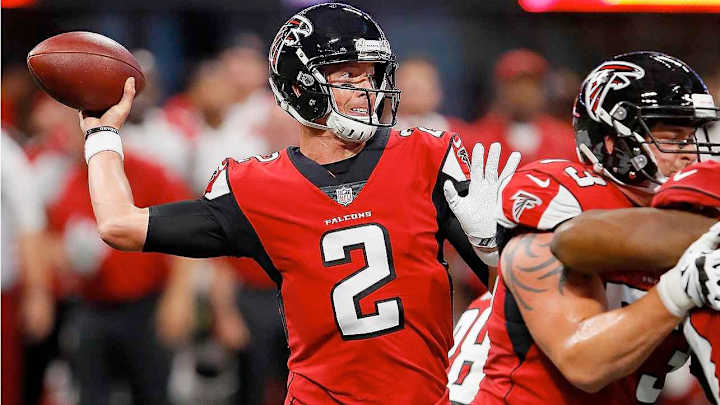Atlanta Falcons: 10 Things You Need to Know

1.Let’s set the Super Bowl hangover aside. Any “analysis” of that amounts to guesswork. The biggest question facing this team is, What will the offense look like under new coordinator Steve Sarkisian? This spring, there was talk of adding new wrinkles. That’s a fine line to walk. On the one hand, the fastest way to fall behind is to not evolve. On the other hand, new wrinkles mean changing what was already one of the greatest offenses in NFL history. If Sarkisian came out and said, “I’m going to mimic everything that Kyle Shanahan did,” it’d be hard to fault him.
2. Under Shanahan, the Falcons’ ground game and aerial attack were synced perfectly. The ground game’s outside zone run-blocking naturally brings verisimilitude to the play-action game, which the Falcons used a league-high 27% of the time, according to Football Outsiders. This kind of advantage can turn a shrewd field surveyor like Matt Ryan into an MVP. Sarkisian will continue with zone running and play-action, and he should take note of the formations Shanahan used. Many of them were condensed, with wide receivers aligned tight inside, just a few yards away from the offensive tackles. That gives them enough field space to go left or right off the snap, and it also creates a lot of natural pick and rub routes. The Falcons must continue aligning receivers toward the middle of the field.
How the Atlanta Falcons Are Handling the Worst Loss in Super Bowl History
3. Another thing the Falcons must continue is playing base personnel. By keeping a fullback or second tight end on the field, the defense usually stays in its 4-3 or 3-4 package, where its scheme and athleticism are more limited. It was surprising that Atlanta let fullback Patrick DiMarco leave in free agency; he was a big part of the base personnel concepts, particularly as a lead-blocker on zone runs.
4. Expect to see running backs Tevin Coleman and Devonta Freeman on the field together. Both are top 10 NFL ballcarriers, and both can split out wide and win as receivers. Defenses will struggle to identify whom to put on the field, let alone what coverage to call, when these two are out there.
Hurricane Irma: Why NFL Should Move Buccaneers-Dolphins Game to Week 11
5. Atlanta’s offensive line is in great shape. Alex Mack, a venerated leader around the facility, is one of the best zone-blocking centers in the game. At tackle, Jake Matthews on the left side has quietly blossomed into a smooth, steady technician. His feet have become more efficient, making his hands more controlling. On the right side, Ryan Schraeder is not impermeable, but he’s one of the few players at his position who doesn’t need help via chip-blocks or slide protections.
• THE MMQB ARCHIVE: Read all the latest stories produced by Peter King and crew
6. The Falcons made the Super Bowl because their young defense improved drastically over the second half of the season. After allowing 28.3 points a game before their Week 11 bye, they gave up just 22 points a game after (including playoffs).
The Morning Huddle: What's Next for Ezekiel Elliott?
7. The improvements were most apparent in the middle. Rookie linebackers Deion Jones and De’Vondre Campbell, as well as first-round rookie strong safety, Keanu Neal, played much sharper mentally, particularly in head coach Dan Quinn’s foundational Cover 3 scheme. Offenses had taken to attacking those guys with deep routes by inside receivers. After the rookies figured out how to recognize those, the rest of the defense tightened the screws.
8. The other defining improvement from the defense came in the secondary. Amazingly, Atlanta’s secondary got better after Desmond Trufant, a top five all-around corner, went down with a torn pectoral in Week 9. Long-armed Jalen Collins played well outside, and Robert Alford traveled with No. 1 receivers all over, including into the slot. In fact, he outplayed Julian Edelman in Super Bowl 51. Collins has been suspended for 10 games (second PED violation), but the Falcons still have adequate depth in Brian Poole, C.J. Goodwin and Deji Olatoye. Multiple backups will be called on. Two things Quinn did more as the season progressed was play man coverage and use a four-corner dime package.
As Adrian Peterson Embarks on His Encore, Running Back Greats Describe Their Second Acts
9.The Falcons don’t blitz often, but they did in the NFC Championship Game to counter a white-hot Aaron Rodgers. Typically, they rely on their four-man rush. In a lot of ways, this defense, which is built on speed, only plays fast when the front four plays fast. It starts with Vic Beasley. Though he led the league with 15.5 sacks last year, he still must refine his repertoire and learn to win in confined spaces. As it stands, he’s overly reliant on speed and requires a lot of space with which to operate.
10. The depth along this defense is extraordinary at all three levels. It’ll be interesting to see how Quinn employs it. He has typically used a large variety of sub-packages, rotating guys at several positions. But that may have been due to having young and limited starters. That’s not the case anymore. With a rising first-string unit, how much will Quinn substitute in 2017?
Question? Comment? Story idea? Let us know at talkback@themmqb.com
